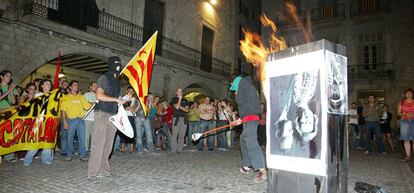Strasbourg: Burning photos of Spanish king is “freedom of expression”
European Court of Human Rights rules against Spain for sentencing two protesters to prison over 2007 incident

In the midst of an ongoing national debate about the limits of free speech in Spain and the laws being used to punish alleged excesses, the European Court of Human Rights (ECHR) in Strasbourg has just given the country a collective rap on the knuckles with a decision that contradicts Spanish courts and states that burning photos of the king is not a criminal offense, but rather a form of free political expression.
“The Court reiterated in that context that freedom of expression extended to ‘information’ and ‘ideas’ that offended, shocked or disturbed: such were the demands of pluralism, tolerance and broad-mindedness, without which there was no ‘democratic society’,” the court stated in its decision.
The facts of the case date back more than a decade. In 2007, Catalan separatists Enric Stern and Jaume Roura burned a large-format photo of the Spanish king and queen during an anti-monarchy protest in Girona, ahead of a visit to the city by then-King Juan Carlos.
Stern doused the photo, which had been placed upside down, with inflammable liquid, while Roura set fire to it, as both were egged on by other demonstrators.
Freedom of expression extended to ‘information’ and ‘ideas’ that offended, shocked or disturbed
A year later, Spain’s High Court (Audiencia Nacional) sentenced them to pay a €2,700 fine if they wanted to avoid jail for the offense of insulting the Crown. If they failed to pay up, they were warned, they would have to serve 15 months in jail.
In 2015, Spain’s Constitutional Court rejected their appeal in a split decision, and cited a ruling from precisely the ECHR that found it necessary to “sanction and even prevent all forms of expression that propagate, incite, promote or justify hatred based on intolerance.”
But in its recent decision, the Strasbourg-based court unanimously found that in this case, there had been a “violation of article 10” of the European Convention on Human Rights, which defends freedom of expression. The ruling not only rejects the sanction imposed by the Spanish courts, but also calls on Spain to compensate the applicants with the same amount that they paid in fines, as well as €9,000 in total for the pair to cover their legal fees.
In a decision broken down into five points, the seven judges who oversaw the case, including the Spaniard Luis López Guerra, found that the acts of the accused were part of “a political, rather than personal, critique of the institution of monarchy in general, and in particular of the Kingdom of Spain as a nation.”
As such, the magistrates rejected the argument of the Spanish justice system that the burning of a photo constitutes a “personal attack” on the king, aimed at “insulting and vilifying his person,” but rather saw it as a “denunciation of what the King represented as the Head and the symbol of the State apparatus and the forces which, according to the applicants, had occupied Catalonia.” This, the Strasbourg judges concluded, “fell within the sphere of political criticism or dissidence and corresponded to the expression of rejection of the monarchy as an institution.”
An act of this type should be interpreted as the symbolic expression of dissatisfaction and protest
Their actions were, the decision found, “one of the provocative ‘events’ which were increasingly being staged to attract media attention and which merely used a certain permissible degree of provocation to transmit a critical message in the context of freedom of expression.”
Strasbourg also rejected that the elements used in the protest, such as fire and placing the photo upside down, “could reasonably be construed as incitement to hatred or violence,” and pointed out that the actions did not lead “to violent behavior or disorder.” The ruling also stated that the intentions of Stern and Roura “had not been to incite anyone to commit acts of violence against the King,” insisting that “an act of this type should be interpreted as the symbolic expression of dissatisfaction and protest.”
“Even though the “staged event” had involved burning an image, it was a means of expressing an opinion in a debate on a public-interest issue, namely the monarchy institution,” Strasbourg concluded.
The ECHR found that the sentence handed down to Stern and Roura, with the threat of jail time if they didn’t pay the fine, constituted “interference with their right to freedom of expression,” which was “neither proportionate to the legitimate aim pursued nor necessary in a democratic society.”
English version by Simon Hunter.
Tu suscripción se está usando en otro dispositivo
¿Quieres añadir otro usuario a tu suscripción?
Si continúas leyendo en este dispositivo, no se podrá leer en el otro.
FlechaTu suscripción se está usando en otro dispositivo y solo puedes acceder a EL PAÍS desde un dispositivo a la vez.
Si quieres compartir tu cuenta, cambia tu suscripción a la modalidad Premium, así podrás añadir otro usuario. Cada uno accederá con su propia cuenta de email, lo que os permitirá personalizar vuestra experiencia en EL PAÍS.
¿Tienes una suscripción de empresa? Accede aquí para contratar más cuentas.
En el caso de no saber quién está usando tu cuenta, te recomendamos cambiar tu contraseña aquí.
Si decides continuar compartiendo tu cuenta, este mensaje se mostrará en tu dispositivo y en el de la otra persona que está usando tu cuenta de forma indefinida, afectando a tu experiencia de lectura. Puedes consultar aquí los términos y condiciones de la suscripción digital.









































